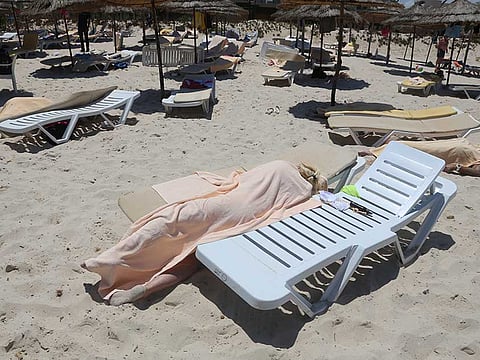Daesh can intoxicate support more readily
Its totalitarian ideology and its blatant disregard for mainstream Muslim public opinion renders attacks in its name both more accessible and more urgent

On Friday morning, Yassin Salhi, a 35-year-old resident of Saint-Priest in Lyon, attached a disembodied head to the gates of the factory which he visited as part of his work, before proceeding to set off a series of small bomb blasts, presumably intending to cause a much larger explosion.
Just minutes after these reports came in, supporters of Daesh (the self-proclaimed Islamic State in Iraq and the Levant), who were already congratulating Salhi online for his exploits, began muttering about a bomb attack on the Shiite Imam Sadiq mosque in Kuwait.
One hour later, Daesh’s internet supporters reached fever pitch, when it emerged that a hotel in the Tunisian resort town of Sousse was in the process of being assaulted by an extremist gunman. Of the three attacks, it is only Kuwait’s that we know to be linked to Daesh: it was officially claimed by the caliphate’s recently minted ‘Najd Province’ — the Saudi branch of Daesh — which named the attacker as Abu Sulaiman Al Muwahhid in its statement.
That said, the other two attacks have tacitly been claimed by Daesh supporters, who commended the efforts of the “lions of the caliphate” involved. Usually, Daesh’s online clique exercise caution when an attack is ongoing — this time, though, they were quick to attribute it to their cause. Whether or not they are right, they are making these judgements based on a number of reasons. There is much to suggest — but nothing to confirm — that all three could have been, in some respects at least, inspired by Daesh: Kuwait’s attack was officially claimed; France’s featured a beheading and a “[Daesh] flag”; and Tunisia’s was almost immediately attributed to the “men of [Daesh]” by some of the group’s most prominent disseminators in Iraq.
Of course, it could emerge that the “Daesh flag” in question was in fact Al Qaida in the Arabian Peninsula’s, or Al Shabab’s — after all, all three groups use the same banner. It could also turn out that Tunisia’s operation was carried out by the Al Qaida-aligned ‘Uqba Ibn Nafi’ Brigade.
Time of heightened emotion
Until it does, though, Daesh fans will continue to keenly lap up the publicity. These attacks come at a time of heightened emotion for Daesh.
On Tuesday, a statement from Daesh spokesman Abu Mohammad Al Adnani was circulated online in which he called for Sunnis to “rush and move to make Ramadan a month of disasters for the kuffar”.
At a time when it is losing ground in Syria, Iraq and, more latterly, Libya, Daesh’s momentum needs a boost. Al Adnani said the words he did, recognising this. It is precisely for this reason, too, that we are seeing Daesh’s supporters clamour to claim credit for these attacks. If it does turn out that the attackers were inspired by Daesh, this does not mean that they were coordinated, let alone planned, by the organisation.
The last few months have resoundingly demonstrated Daesh’s ability to incite terrorist operations abroad. Its ideology is at once more accessible and more intoxicating to its international supporters than that of other extremist groups.
The totalitarian infusion of utop-ianism and eschatology, combined with its blatant disregard for mainstream Muslim public opinion, renders attacks in its name both more accessible and more urgent.
For the Daesh enthusiast, statements like that of Al Adnani on Tuesday act like direct orders. For a long time, many analysts, myself included, have been warning that the month of Ramadan would be a violent one.
It is something that Daesh propaganda has constantly alluded to in its official messaging, as the organisation’s propagandists have sought to assert its stubborn defiance in the face of the global coalition and longevity of its political programme. While it may appear otherwise, attacks like these are not irrational — they lend momentum to the extremist cause like nothing else.
— The Telegraph Group Limited, London 2015
Sign up for the Daily Briefing
Get the latest news and updates straight to your inbox


